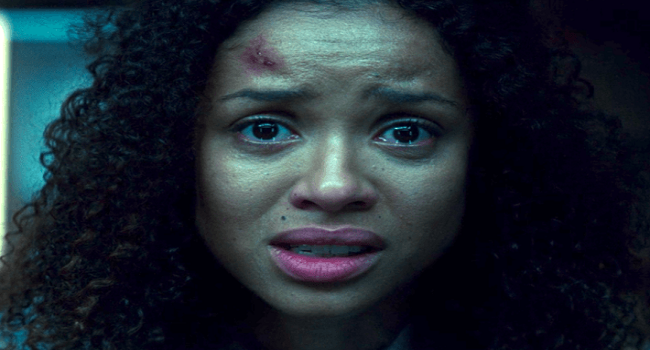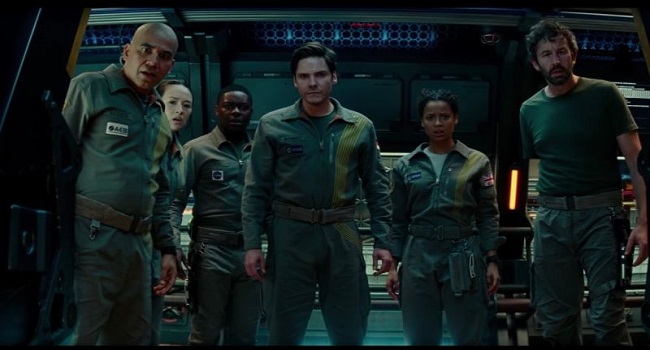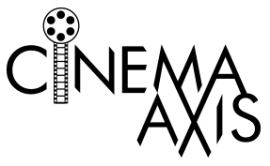
The legacy of Julius Onah’s latest film The Cloverfield Paradox, for better or worse, will forever be tied to its unconventional release. After having its release date bounce around like a ball in a tennis match, Paramount decide to sell the hotly anticipate addition to the Cloverfield franchise to Netflix. The streaming platform then surprised its subscribers by releasing the film a mere few hours after unveiling the first piece of marketing during the Super Bowl.
While the Cloverfield films have greatly benefitted from sly marketing in the past, this was something different. On one hand it was nice to have a film not be spoiled by multiple overly long trailers, and months of speculations by amateur internet film sleuths. The other side of the coin is that the decision continues a disturbing trend of Netflix being one of the few avenues for “riskier” titles to be launched.
Though by all accounts The Cloverfield Paradox is not even that risky.
The film is essentially a slick looking science fiction tale whose influences run the gambit from Alien to Event Horizon. Take away the occasional references to the chaos occurring on Earth and it is easy to forget that this is a “Cloverfield” film.
The central story takes place in a near future where the Earth is suffering from a global energy crisis. Hoping to remedy the issue, an international crew of scientists – Hamilton (Gugu Mbatha-Raw), Kiel (David Oyelowo), Schmidt (Daniel Brühl), Monk (John Ortiz), Mundy (Chris O’Dowd), Volkov (Aksel Hennie) and Tam (Ziyi Zhang) – venture into space to test the Shepard particle accelerator. A device that could potentially supply the planet with infinite energy.

Stuck in space for two years, and running out of time, the crew finally experience success as the accelerator generates a stable beam. However, this joyous moment is short lived as the entire ship is thrusted into what one pundit dubbed a “Cloverfield Paradox”; a rip in the dimensional lining that not only merges multiverses together but also opens a portal that could potentially allow creatures from other dimensions into Earth.
Of course, strange things begin to occur on the vessel, including the sudden appearance of another crew member, Jensen (Elizabeth Debicki), as the station begins to take on a life of its own.
One of the things that the Cloverfield franchise, unlike the various superhero cinematic universes, does well is create an expanded world in which each film feels unique. The original Cloverfield is a fun found footage monster film, and 10 Cloverfield Lane, which is the best of the three, was an extremely effective thriller. The Cloverfield Paradox continues this tradition, however it is not as successful as its predecessors.
Though Onah shows much growth since his debut film The Girl is in Trouble, his latest work causes a bit of a divide within the viewer. While it is fun to see this extremely talented cast of actors playing within conventional sci-fi tropes, Gugu Mbatha-Raw is great in the film, most of the characters lack any real dimension. It often feels like the crew’s main purpose is to make silly decisions that will allow them to die in elaborate or heroic ways. Furthermore, the script borrows so many beats from other films within the genre, that The Cloverfield Paradox frequently loses its own sense of identity.
The weakest film in the franchise, The Cloverfield Paradox is ultimately more entertaining than it should be given how ridiculous the script gets in the latter half. However, those looking for a science fiction film that steps beyond convention will be rather disappointed.
3 Comments
Comments are closed.

Ouch! This movie is taking a thrashing. Piecing my review together and finding more to talk about than I expected.
I think critics have been extra savage to some of the Netflix release of late. I find it interesting that more press has been written about this film and Bright than say Okja or First They Killed My Mother.
That’s a really interesting point. Both are moving that feel more like big screen releases. Could that factor in? It’s a good conversation. First They Killed My Father made my Top 10 list but it seems many critics didn’t give it an ounce of attention. And of course Oscar didn’t give it a nod either.